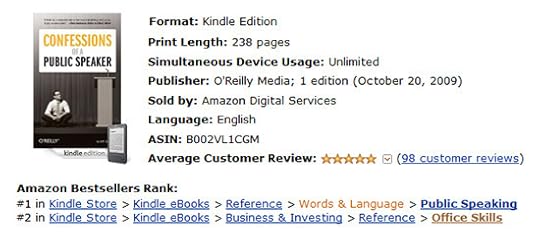Scott Berkun's Blog, page 76
December 21, 2010
Video: How to write 1000 words
I spoke at Ignite 12 in Seattle and presented this for the first time. It's time-lapsed video of me writing an essay, called How to Write 1000 words.
I was inspired by Picasso's movie The Mystery of Picasso (discussed in the Myths of Innovation), and Matt Wiley's video of page design, where they bravely work, and makes mistakes, in from of a camera, showing what creating things looks like.
Here's the video with audio commentary: flip to the HD version, which makes it easier to see what I'm doing.
Stats:
It took ~150 minutes to write.
I wrote it over 2 days.
Yes, this is a hack of the ignite format. Hacks are good, as I've explained before.
The video is 30x normal speed.
Michael Pick helped tremendously with doing the time-lapse capture and production.
I finished with 1600 words on the page, to produce the 1000 word essay
Related posts:How to write 1000 words
Attention and Sex: 5 minute video
New essay: Creative thinking hacks
Chapter 4: London
What I learned at Seattle Ignite 6
December 17, 2010
NSFW: most used curse words in history?
Ok, this is pure fun. I took George Carlin's 7 Dirty words (The only words you can't say on U.S. television, or couldn't), and put them into Google Labs Ngram viewer (which searches for usage of words in the entire google books archive). I made a guess before I ran the query – I expected all the words to rise in usage over the last 40 years. I was wrong:
Chart shown below / link to query:
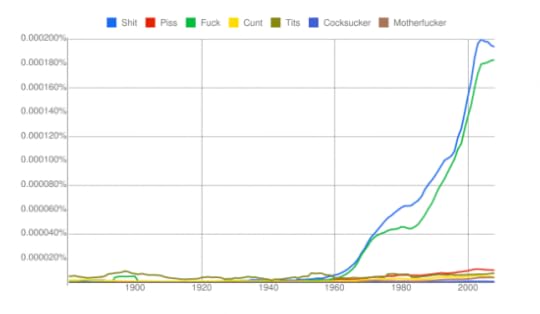
As some of you know, big ranges in data hide trends. So I took out the big outliers (Shit and Fuck) and ran the same query, yielding the chart below (query here) – overall positive trend on all of them, but more interesting than the first chart:
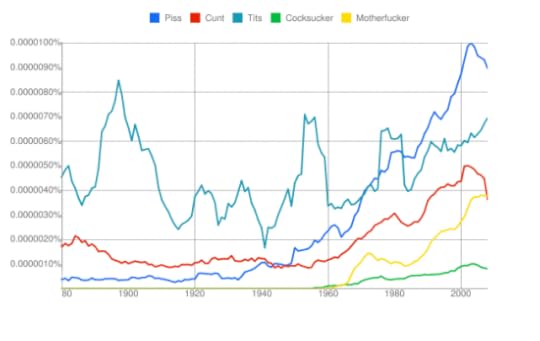
Related posts:Innovation vs. Usability: In numbers
Taking back the web: the next generation
This week in ux-clinic: Lost in the tag cloud
Innovation vs. Usability: In numbers
Playing around with the new Google Labs Ngram viewer (which searches for usage of words in the entire google books archive), I compared the use of four words, usability, innovation, prototype, and experiment, over the last 100 years. Chart shown below:
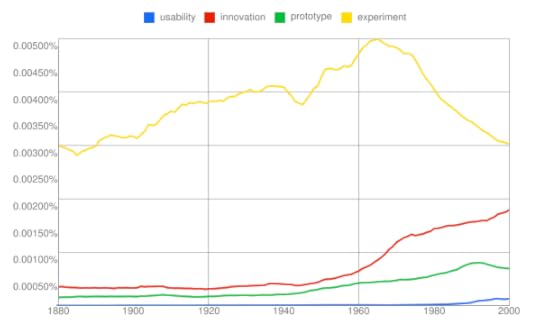
I complain often about abuse of the word innovation. I also advocate the use of the word experiment. Interesting to see the decline of the later at the same time as the rise of the former. I'm clearly on the losing side.
You can run this query, or build your own. It's fun. Not sure what conclusions can be drawn from such a wide pool of data, but interesting none the less.
Related posts:How to kill innovation hype
Practicing what I preach: Innovation abuse
How to innovate on time
December 15, 2010
#1 on Kindle: Confessions of a Public Speaker
Confessions of a Public Speaker is currently the top book on Public Speaking on Kindle. With 98 reviews and a near 5 star average, it's a nice surprise to see it still doing well. Thanks to everyone who's bought a copy.
Sadly there's no way to gift a Kindle book yet. However, you can buy / gift the print edition or buy the kindle edition here.
And you can read two free excerpts (Attack of the Butterflies, or $30,000 an hour) if you want a sample first.
If you've read the book and haven't reviewed it on amazon, please do. It helps more than you know.
Related posts:Free chapters from Confessions
My books are now on Kindle
Webcast: Confessions of a Public Speaker (free!)
December 14, 2010
Quote of the week
"Beyond doubt, the most salient characteristic of life in this latter portion of the nineteenth century is SPEED – what we may call hurry, the rate at which we move, the high-pressure at which we work;- and the question to be considered is, first, whether this rapid rate is in itself a good; and, next, whether it is worth the price we pay for it."
– W.R. Greg, Life at High Pressure (1877)
Also see, The cult of busy.
Related posts:This week in pm-clinic: The need for two faced managers
The cult of busy
Obama vs the iPad (information overload)
December 13, 2010
Truth is found between these posts…
There's an old George Carlin joke about how between Idaho's state motto "Famous Potatoes" and New Hampshire's "Live free or die", the truth can be found.
Noticed today, on the this blog, two polar opposite posts, One on Wikileaks Considered, the other on Smell-O-Vision, were the top two. Amazing. Thanks for reading my crazy, and oddly diverse, thoughts.
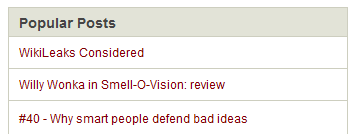
Related posts:Willy Wonka in Smell-O-Vision: review
WikiLeaks Considered
10,000th comment: thanks
Willy Wonka in Smell-O-Vision: review
The Seattle Film Festival theater does cool things – this week they ran a special showing of Willy Wonka and the Chocolate Factory, in Smell-O-Vision. Yes, Smell-O-vision. Being a historian of invention I knew a fair amount about Smell-O-Vision, and had to check it out.
I wasn't alone: the line went out the door and the theater was packed.
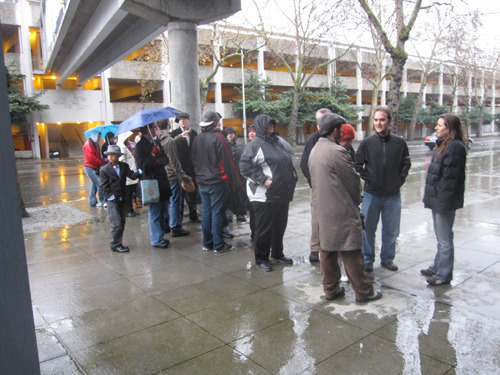
To my initial disappointment, it turned out that unlike the original Smell-O-Vision, or its arch-rival AromaRama, SIFF didn't bother to install expensive ventilation systems to pump artificial scents into the theater. Instead they went guerrilla – each person gets a bag of candy and smelly things. This turned out to be exceedingly clever.
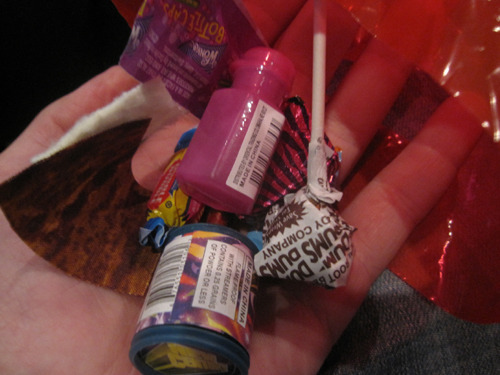
The pre-show instructions, delivered by our very own Oompa Lumpa, explained that on-screen prompts would tell us when to smell, eat, chew or open the various objects in our bags. He also told us that "tasting is just smelling with your tongue".
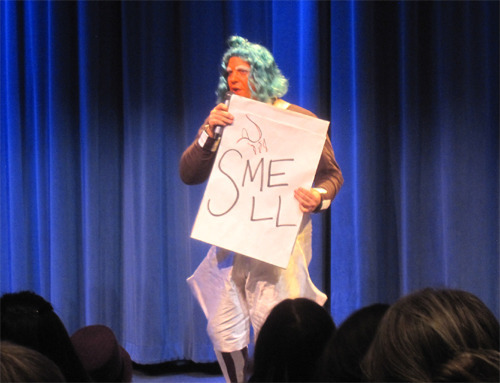
Here you can see what the on-screen prompts look like. They also showed subtitles for all the lyrics to all the songs in the movie, making it a sing-a-long as well as a smell-a-long.
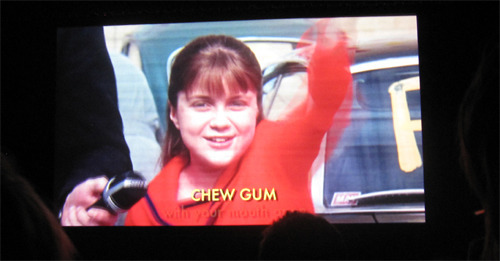
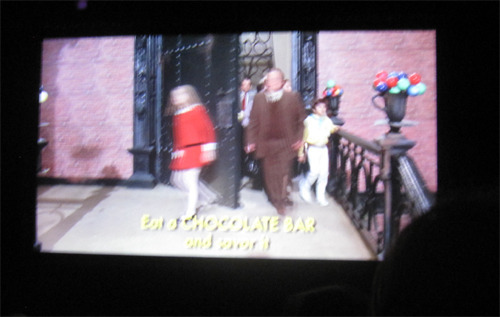
And it works. When 200 people all start eating chocolate at the same time, the room does smell like chocolate. When everyone eats cherry bubblegum, it smells like cherry. This simple approach to the problem was definitely way more effective than Smell-O-Vision ever was.
A particularly fun moment is when Charlie and GrandPa Joe are in the Fizzy Lifting Drink room – in the theater we were instructed to blow bubbles, and blow we did, filling the the theater with the same bubbles that were on the screen.
The theater was 60% children, which usually means I'm in for a nightmare film experience. But this event was so fun, creative and entertaining, and the grand silliness of the movie, combined with all the activities everyone is supposed to do, made it really fun. I'm a big fan of the film (70s satire at its finest) and this might have been the most fun experience I've ever had watching it.
SIFF promises to run it again next year. And they do similiar events with other 70s/80s movies. Labyrinth quote along is next week.
Related posts:This week in ux-clinic: vision and collaboration
How to watch a Michael Bay film
Why vision documents stink
December 9, 2010
WikiLeaks Considered
I was working on a piece about WikiLeaks, when I found this cogent comment, related to the recent U.S. State department leaks (Cablegate).
Vince Kuratis wrote on a TechCrunch piece about WL:
The first question should be: Do you believe governments have the right and/or responsibility to keep certain types of information secret or private. This might include military information, diplomatic information, medical records, etc.
If you answer this question "Yes", as I expect most people would — the argument shifts from WHETHER the government has the right to preclude information from being leaked and made public to WHAT TYPES of information and WHAT CIRCUMSTANCES to which this should apply. Then you get to the question of whether wikileaks fits those circumstances, but you've acknolwedged [sic] government's right and responsibility to keep SOME things secret.
It's a good point and its opposite is also true: it's the job a free press to push to reveal more about what's going on than a government wants. Governments tend to protect information, and media tends to want to reveal it. This is an old line of tension with a messy history, with no simple answer. The balance between both forces is what matters, rather than one dominating the other. There is no utopia at either end of the spectrum, only a tenuous and ever-shifting balance somewhere in the middle.
There are many examples of progress being driven by leaks. The Pentagon papers changed our perception of the Vietnam war, for example, and its publishers were tried, and dismissed, under the 1917 Espionage act. But clearly we do not want everything public. Some things like the passwords to the Federal governments social security computers, terrorism on U.S. soil response plans, or the combinations to the locks on the vaults at the Federal Reserve, should be excluded from the public domain.
Everyone seems to think they know what the right balance is, which is insane – there is no way to be certain, which is why the tension between transparency and opacity is paramount.
There are three checkpoints that define the balance:
What government leaders decide to disclose, both to the public, and within the government itself.
The person inside an organization considering leaking something, who compares the pain their "disloyalty" to their organization will cause themselves and others in making the leak, against the possible long term greater good (See Whistleblower)
The journalist receiving the leak who, using their professional judgment, discerns on their own, or through discourse with representatives from the organization the leak is from, what the true greater good is and what should be withheld from the public and for how long (e.g. See NYT's explanation of its coverage of Cablegate)
WikiLeaks does make journalistic claims, but they separate themselves from the rest of the media world, staking a claim that #2 isn't porous enough. They have placed themselves on the far left, shifting the playing field towards transparency. Existing media suddenly looks more moderate to governments, and even if Wikileaks is ignored in the future, the landscape shifts – I'm assuming this is their hope.
My key take so far: It's not progress or regression that's happened, so much as a disturbance. How governments and other media respond over the next weeks and months will define whether this is a step forward or backward. It's an opportunity for change, and a forcing function for reconsideration, but so far not much more.
In summary, it's no surprise that:
WikiLeaks released these documents – there's a long tradition and in each case it was messy, confusing and painful. Someone can be committing a crime and making progress at the same time. Impossible to sort out in the moment, especially when a single leak has 250,000+ documents.
The U.S. and other governments are pissed and calling it a crime and Assange a terrorist. That's part of their job. If they publicly applauded the unauthorized release of confidential documents, they should be fired.
Internal communications of any organization will always contain harsh criticisms of other organizations, including allies. It'd be more disturbing if every cable said "We love everyone, especially you", they'd either be phony cables, or proof the entire U.S. government had been lobotomized.
We hear about distractions like Julian Assange's prosecution for unrelated charges. His personal behavior is mostly irrelevant to Wikileaks, free press vs. government control, and the idea of transparency.
What's your opinion? Do you know for certain that this is for good or for bad? How do you know? Or more importantly, what am I missing?
No related posts.
December 8, 2010
Seattle Ignite #12: the recap
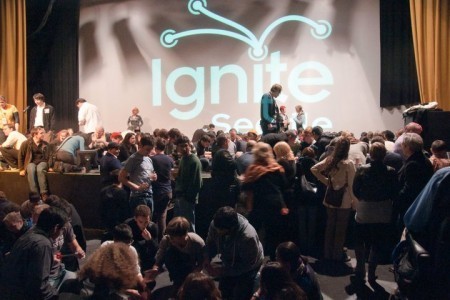 Last night was the 12th Seattle Ignite and they celebrated their 4 year anniversary. How awesome. I had the honor of speaking at the first Ignite in 2006, and it's amazing how far this thing has come.
Last night was the 12th Seattle Ignite and they celebrated their 4 year anniversary. How awesome. I had the honor of speaking at the first Ignite in 2006, and it's amazing how far this thing has come.
When it started it was a crazy format that few understood (20 slides per speaker, 15 seconds per slide, automated = 5 minutes per talk. 10-15 talks per night, inspired by Pecha Kucha). Half the fun was watching smart people struggle live on stage with their own slides. Since the bar for entry was low, it was safe for people to take a chance, and the audiences were super supportive as a result. But people have seen this enough they're gaming the format – some people are exceptional at optimizing for this kind of speaking.
Which makes me think its time to change the format, or at least encourage more curveballs and cheats, like I recommend in the Ignite talk I gave about how to speak at Ignite. This isn't the Olympics. There's no score and no prizes. If you have a great idea that requires hacking the format, do it. What is a "slide" really anyway?
As long as something happens every 15 seconds, the goal of more interesting presentations has been served. You could pick 20 pretty backgrounds that have nothing to do with what you're saying and show those (juxtaposition can be cool). Or have 20 blank slides. Or have a jigsaw puzzle made from one slide that fills in piece by piece every 20 seconds. There's plenty of room for innovation here.
I hacked the format last night, showing a time-lapsed video of me writing this essay as my 5 minutes (I had permission from the organizers). Some people said to me after "but you're cheating" and I said "Absolutely. But was it interesting?" Rules are the means, not the ends.
Here's my actual recap:
I didn't catch all the speakers, but here were my notes.
Karen Cheng gave one of the best Ignite talks I've ever seen (How to solve a song). It was interesting, clever, informative, funny, involved live music, and exposed the basic mathematics of pop music. Her closing medley of about 12 pop song choruses based on the same 3 chords was brilliant. When this is online as a video, it will be hugely popular. Very impressive.
Mandy Sorensen talked about parasites. Watching this made me think how cowardly I am for picking topics easy to find interesting. Not sure I can make parasites fun, but she did. She managed to make this entertaining and oddly, if grossly, captivating. She did cheat by showing a picture of puppies though, but as I said, cheats are ok.
Gregory Heller. SCRUM Project Management For Wedding Planning is a great title, and he delivered. The concept of Invested/Committed applied to weddings was apt. He also wins a prize for showing a diagram and immediately saying "Don't try to understand this diagram". Awesome.
Justin Martinstein - He runs the 400 person game at the beginning of the evening, and every time I'm thinking "there's no way people will participate" and yet every time he gets 80% of the crowd up on stage, in groups of mostly strangers, to work happily together on some crazy team project. Proof our species does not (always) suck. Amazing.
As a testament to how cool the Seattle Ignite crowd is, Emily Chen's talk on owning fewer things (Have less, live more) had technical issues. But when she let the crowd know, they gave her a rally of cheers and encouragement. And she made the right call: abandoning her slides, and just speaking directly to the crowd.
Sadly I didn't catch James Callan talk about grammar Nazi's or Joel Grus talk about how to be funny. Hoping to catch these and the other talks I missed online.
Related posts:What I learned at Seattle Ignite 6
Speaking at Ignite Seattle, Wed Night
(Seattle) next ignite, tommorow night
December 7, 2010
How to write 1000 words
All writing is comprised of three things, words, sentences and paragraphs. If you know a few words, you can make a sentence. If you write a few sentences you can make a paragraph. Keep it simple. In the end, emails, blogs, books and novels are all made from the same substances. As long as you plan time to revise later, putting words down is easy.
There's no right answer for what to do first. It doesn't matter as long as you do something. Make an outline if you like. I often do. An outline gives structure, or the illusion of structure, which helps. Other times I have to turn off my mind and jump in. Only after I've driven myself mad wandering the page like an idiot can I map where to avoid, and where I'd like to go.
Writing begins with ideas, but we forget ideas are whispers in our minds. They're always there. The trouble is we overpower the whispers with the loud voice of what we think we want our ideas to be. It takes quiet patience to listen carefully and that's what creativity often means: simple quiet courage.
I keep a notebook with me at all times and that's one habit that helps. In conversations with friends, when watching movies, or waiting for the bus, I silently write down little ideas. Sometimes as I write I discover more ideas beneath the first, so I write them down too. This may last a moment or five minutes. I have no rules other than writing little things down. I try to capture what's in my head well enough to make sense a day or a week later when I return. Study a genius and you'll find they had notebooks, sketchpads or prison walls to capture their thoughts. Our minds are not enough. Give me an assignment, and the first thing I'll do is make sure my notebook is around with me all day.
Notebooks repel the fear of blank screens. They make it easy to copy a list from the book and put it on the top of any new thing. And the tool that holds the page is mostly irrelevant. I write in WordPress, Microsoft Word, Notepad, I don't much care, and chasing tools is a waste of time. Shakespeare, Hemingway and Carver didn't need much from their pre-electric and pre-web tools to write masterpieces and neither should you.
I don't want a detailed outline, but I don't want vagaries either. I aim for the sweet spot, a list of short sentences that demand explanation. I want sentence grenades, phrases loaded with opinion generating shrapnel for my mind. When I read them on the page I expect them to explode into opinions, thoughts, riffs and rants. How they explode depends on where my mind is at the moment. On another day they may send me to a different place, but I don't worry about that day. Sometimes I abandon half the outline, or change the order of the sentences, or discover I have the opposite point of view I began with. I withhold judgment until there are enough words on the page to work with.
There will be dead ends and false starts but I don't care as long as there is motion. Writing, but not revising, is all about motion. I'll move to the next point and the next, hoping each grenade explodes, or reignites others, giving me a page of fodder to kick around. Like a fire when you've run out of wood, I can sense when the momentum has slowed and as I get my last runs in, I let it die. Then it is time for the work to begin.
In the first moment people get stuck they get scared. Inexperienced writers fear being stuck means they've done something wrong. I know the opposite is true. This is where the real work begins. It's not writing until you're stuck. When you're stuck, you're forced to think and thinking is good. Thinking is the entire point to the enterprise of writing. To think and feel and through writing, express those thoughts and feelings to others. When you're stuck it feels wrong, but it's righteous. You're being forced to reconsider what you're doing and good writing demands consideration. Better for the writer to reconsider when writing than to have the reader consider it later and find it wanting.
When stuck I do one thing: Go to the top and reread. What seemed like a dead end will go away once you approach it again from the sequence of ideas in the preceding paragraphs. This is the one habit that makes me a better writer than the other guy. I read what I'm writing and improve it every time I read it through.
People say "that book was a great read" as if it's a surprise. Isn't that sad? All books should be good reads. No writer writes trying to be a bad read. A boring read. And the books that read better are ones the writer read often while writing it. Better writers might simply be better readers. They more diligently read their own work as they're writing and fix mistakes of flow, pacing and thinking, which are more important than vocabulary, flair or style, the three pretentious distractions we often think signify good writing. They often signify big egos and not much more.
There's not much else to know. As I reread I refine like a river into a canyon, chipping away each time at little pieces, polishing the bits that hold up, and pushing away the ones that don't. And when I can read through the whole piece without much changing I know I'm almost done. The last thing to do is to walk away. I need one final read with fresh eyes, eyes like my reader's will have. And when I return there's one more polish and pass it's then time to set it free and on its own into the world.
————————-
Two notes:
This essay itself is 1000 words long.
A time-lapsed video of the making of this essay will be presented at Ignite Seattle 12.
Related posts:How to write a book, part 2
Why you fail at writing
How to write a book – the short honest truth

